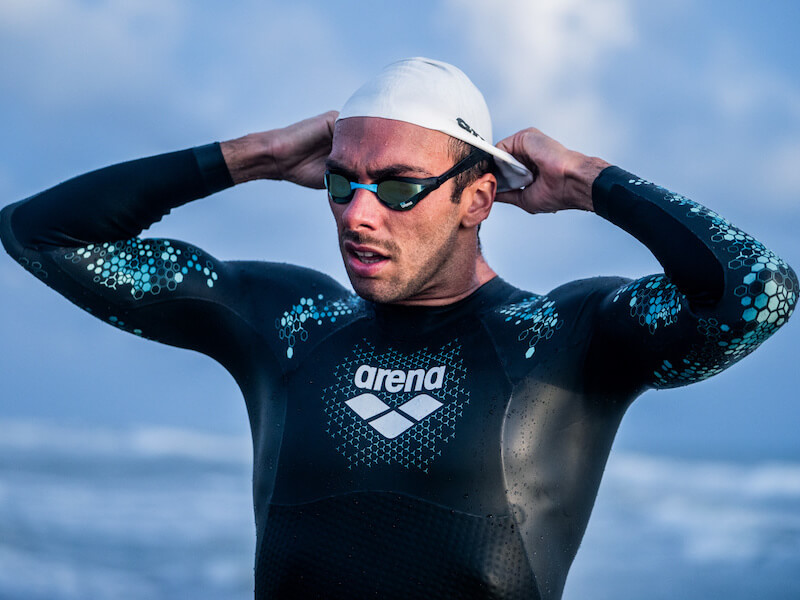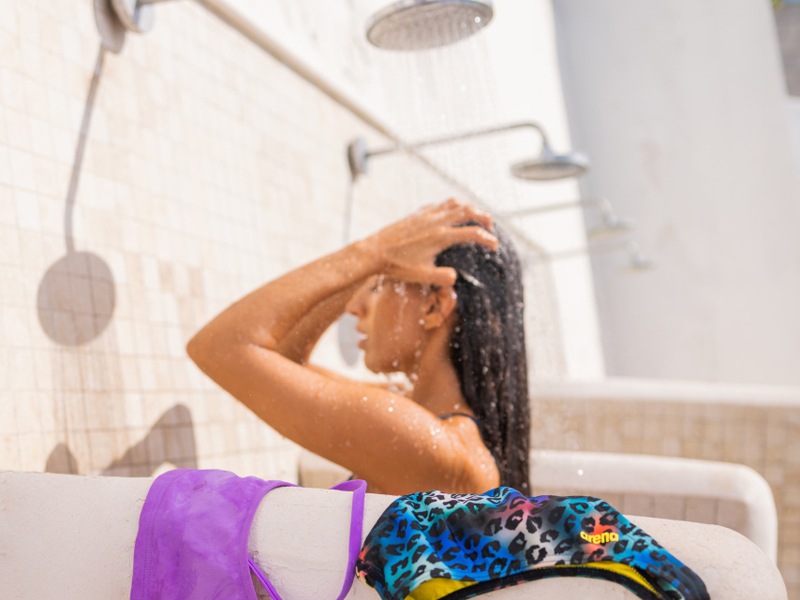Optimum Hair Care For Swimmers in Open Water and Pools
It may seem unbelievable, but many people don’t enroll at the pool because they are concerned about the health of their hair. The fear of dry, weakened hair and losing body and shine after so many hours in the water pushes them to give up on the wonderful sport of swimming. There’s no denying that chlorine and the substances used to fight bacteria in the water are harmful to your hair. This does not mean that there aren’t plenty of effective ways to promote hair care for swimmers so you can enjoy the pool without further concerns.
In this article, you’ll find out what water exposure actually does to your hair. Following that, you’ll discover what you can bring to the pool to help avoid swimmer’s hair. Finally, we’ll give you some hair care for swimmers tips on how you can protect your hair before and after your swim.
The Threat That Water Poses
Open water swimmers will be pleased to know that freshwater devoid of pool chemicals will usually not pose a problem and is basically the best water your hair can be exposed to. This rule only applies if the water is “soft” though. Water with a high mineral content can be damaging to hair in the same way that pool water can. Research your lakes before you swim in them to consider how you should look after your hair.
Saltwater swimming regularly can really take its toll on your hair. Unwanted frizz and split ends are caused by salt drying out your hair, which can be a pain to detangle post-swim. The scalp is also affected as it becomes drier, which can pose a risk of dandruff. Be aware that color-treated hair is even more vulnerable to the dryness caused by salt exposure.

Chlorine damage is a real hair care for swimmers issue for those that swim regularly, and we should all take steps to minimize damage before and after swimming in a chlorinated pool. Like saltwater, chlorine can result in frizzy dry hair with split ends. Chlorine will strip hair of its natural oils and can even cause breakage of cuticles. A buildup of chlorine is even worse for those with color-treated hair as it speeds up the fading process and washes out hair color.
Hair care for swimmers extends beyond the pool, chlorine isn’t your hair’s only enemy, and there are many other factors that can damage your hair every day. City dwellers should protect their hair from smog. Smoking can also cause unwanted changes to hair color. Harsh chemical treatments used to achieve certain hairstyles cause lasting damage too.
It’s important to take care of your hair 100% of the time, without having to give up the pleasure of the pool. Regular saltwater and pool swimmers should have a solid hair care routine if they wish to avoid damaged hair since their hair is exposed to harmful substances more than the average person.
Hair Care For Swimmers: Essential Items
It is important to take everything you need in your bath bag; you shouldn’t forget your brush and comb, a fairly powerful professional hairdryer, and specific products to protect and nourish your hair. You can also take advantage of that hour or two of swimming to apply a mask that, under your cap, will increase its restorative and moisturizing effect until you wash it out with shampoo.
Washing your hair straight after swimming also frees up more time for the rest of your day. Your body is already wet and coated in chlorine, it makes sense to shower and take care of your hair post-swim.
After you’ve washed your hair well enough to remove chlorine, if the weather permits, you can leave the pool with braided wet hair, which will then dry naturally.

In the winter, remember to always wear a hat, not so much to protect your hair but to avoid getting cold because of the low temperature!
Protect Your Color
In addition to weakening your hair, chlorine can cause your hair to change into an undesirable color. Without proper hair care for swimmers, color-treated and natural hair is at risk. For example, blonde hair can risk showing tinges of green, while brown hair may start displaying shades of orange.
One of the most recommended methods to avoid this phenomenon is to dampen your hair a little before entering the water and apply a nourishing conditioner, indulging the tips. Then pull your hair back into a ponytail and put your swim cap on. Your hair will then be protected and avoid the absorption of chlorine whilst receiving deep conditioning. This will allow your hair to retain strength and its natural luster.
Hair Care For Swimmers: Top Tips
If you want to enjoy a long and fulfilling swimming hobby or career, it’s imperative that you look after yourself in the pool. Protecting your hair is also important so that swimming doesn’t have an impact on your personal life.
By surfing the net or asking your friends, you will surely become aware of many remedies and DIY solutions to protect your hair in the pool. In fact, there are countless tips and suggested remedies that come directly from diligent pool-goers. But which ones are the most effective?
Here are a few that we think are particularly valid:
- Take a bottle of water and vinegar, the latter substance known for its reinforcing and shielding properties, and put it on the ends of your hair after shampooing.
- Before you put on your swim cap, apply hair products such as linseed, castor, or coconut oil. Almond oil and shea butter also work well.
- Wear a fabric cap under your silicone cap: your hair will be more protected, even if your hair is wet at the end of the session.
- Do not wash your hair in the 24 hours before going to the pool; the sebum in your hair acts as a natural barrier against treated and chlorinated water which does offer some degree of protection.
- Pull your hair up into a ponytail under your swim cap to prevent knots and tangles.
Make Hair Care Part of Your Workout
Any regular activity in life will no doubt cause negative effects on your body and mind one way or another. Thankfully swimming is a very low-impact sport, so we don’t have to worry about the common injuries seen in high-impact sports such as rugby or soccer. However, you do need to pay attention to your skin care and hair care if you are swimming regularly.
Open water swimmers, remember to always prepare your hair and wash it well after swimming in saltwater. When swimming in lakes, double-check if the water is rich in minerals before deciding on your hair care routine. When pool swimming, protect your hair before you enter and do your best to ensure good chlorine removal while washing. Extend your hair care out of the pool as well to provide lasting protection.
Don’t forget to bring your hair care for swimmers essentials for post-swim washing and take the correct steps to look after your hair whether it is color-treated or completely natural.
A swim cap is a great tool to keep leave-in conditioners in place during a swim. They also reduce drag and keep your hair out of the way of your eyes and other swimmers. Check out arena’s online store for swimwear and swim tools that will make your swim sessions a more comfortable experience.









